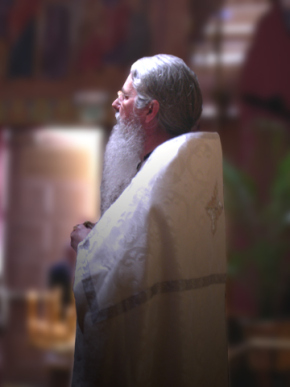 by Fr. John Guy Winfrey
by Fr. John Guy Winfrey
Preaching is a task that we priests do at least every Sunday, and many of us more often. St John Chrysostom, my patron Saint, said that this is one of the most important tasks of the priest. I have been asked in the past how I prepare homilies. I preach without notes before but that doesn’t mean that there has been no preparation. However, I think beyond the technical component of what sources do I look at [first and foremost the Fathers of the Church] or if I look at the Greek to see if there is something there that should be brought out [Yes, I often look at that], I thought I would give what I have found to be the most important points of preparation for a homily. This is only my experience and thought, each priest is different, but I think these still apply.
The first, of course, is prayer. I don’t mean by that prayer for this sermon and its content. Homilies ought not to be thought of a one time events like an exam or a paper. They are part of a living relationship between the priest and God, and the priest and the faithful. The priest must pray. He must pray daily, and he must pray many times a day seeking the face of Christ and union with him. There is no more important item for good preaching, than for the priest to be struggling to grow in prayer and holiness.
This brings up the necessity that he should be making some progress at becoming humble. One of the worst things to hear in a homily is the ego of the priest. It is more than off putting, it is a distraction from Christ. In seminary we were all taught a rule that we ought not to say, “you”, but “we”. As I have seasoned a little bit, I find that that is an overgeneralization. Sometimes ‘you’ is the only appropriate pronoun. For example, “You have taught me by your example what it is for a community to love one another.” What I suspect was behind the rule of ‘we’ and not ‘you’, was the cardinal necessity of humility.
Humility allows us to listen to God, that he might give a word to us for his faithful and for ourselves. God desires to guide us and move us to love him. He desires to teach us and to encourage us. He desires to move us to repentance. The priest will not hear that unless he first learns at least a little humility so that he might hear God’s voice and not his own thoughts. Part of this also points to the priest, because God wants the priest to be made holy too. The priest who preaches best usually is also preaching to himself as well as to the faithful. God gives a word for us all, but humility is needed to hear it. A narcissist might be a commanding public speaker, but a humble servant — regardless the degree of polish and finesse — will be the more powerful because he words are not his own and because he covers himself in the priesthood of Christ and disappears.
Study is necessary for good preaching. But if we study only for the upcoming sermon, like cramming for an exam, we will always be empty. We are admonished to be prepared to always give a good word for the joy that is in us (1 Peter 3:15), to prepared in season and out of season. So, we must always be learning more about our faith, about the Scriptures [reading them daily], about the spiritual life of the Church, the writings of the Fathers, our theology. These things will then be ready for us when they are needed. But our study cannot just be about the Church. We must also read about other things like history, current events, and things that interest our faithful because we must be able to communicate the Truth to them where they are, “with gentleness and reverence” (completing 1 Peter 3:15). So we must take the long view of studying.
As we preach, we must be fully aware that it is a communication that is truly a two-way street. The faithful communicate to us whether or not they understand what is being said, if their minds are wondering, if they are troubled, if they are being encouraged… We must recognize this so that we might make adjustments as we are speaking to help them. For this it is necessary that the priest should have an intelligent and quick mind, else he will be stuck on his page or outline and not be able to communicate the Good News of Christ effectively.
Finally, the priest must know real life. This is rarely said and it is why so very few priests ordained at an early age are powerful preachers. The priest must know what it’s like to physically work hard, to sweat, to play football (or other sports, or even work) when hurt, to not have enough money, to have too much money, to have gone hungry, to struggle against sin, … Unless the priest has gotten his boots dirty and worn, his words won’t be of much use to the faithful. In other words, the priest must be real and not caught up in an ivory tower.
These are my thoughts, and they may not be helpful to everyone. I am always willing to learn from others because I am a sinner and struggle to grow in holiness and in my priesthood.
See also The Preaching Pyramid
